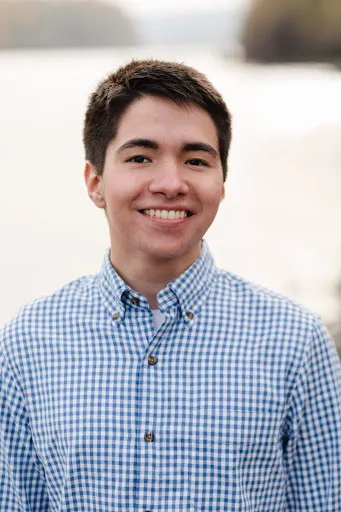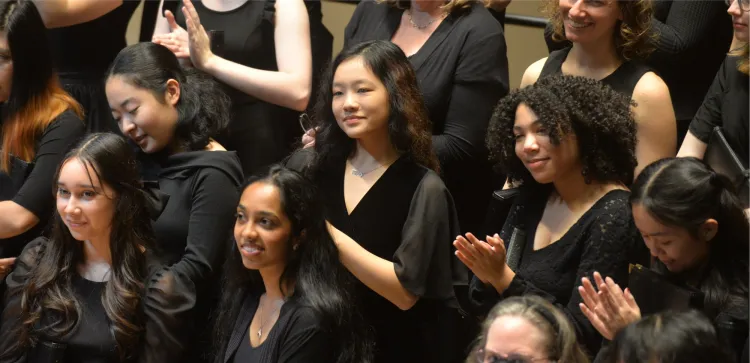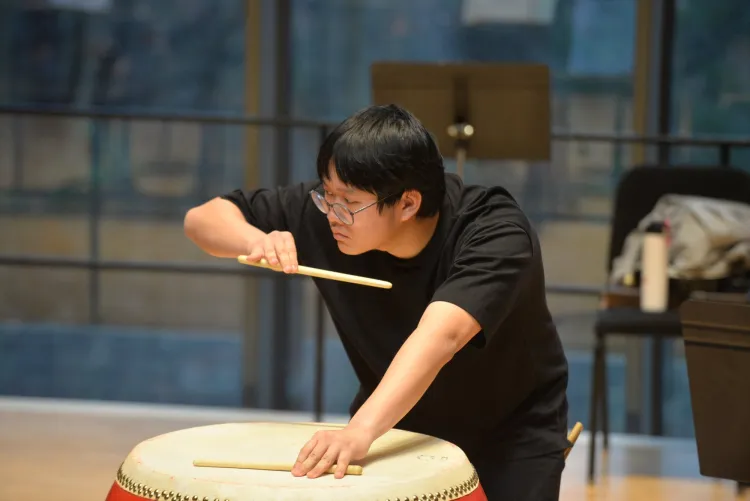Intro to Music
Three New Swarthmore Students Share Their First Semester Experiences

Nico Johnson '26
Crossing oceans, instruments, and genres, music has been a constant for Chung Sze Kwok ‘27, Nico Johnson ‘26 and Dylan Lee Pak Han ‘24. A first-year (Kwok), a transfer student from Pomona College (Johnson), and an exchange student (Lee) from Yale-NUS — a liberal arts college in Singapore — the three hail from different corners of the globe, with diverse backgrounds and unique musical journeys. I sat down with each of them over the course of their first semester to find out what attracted them to Swarthmore College and learn how music has continued to shape their time here.
Musical Background
At the age of five, Chung Sze Kwok started piano lessons on an upright piano in her apartment in Hong Kong. By the age of ten, she was preparing for her Grade 7 ABRSM exam — an examination board that offers graded exams and diploma qualifications in music — amidst a move to the UK, accompanying choirs, and playing the piano for musical theater in middle school.
Around this time, Kwok’s interest in the violin grew. “Playing the violin meant I could be in a string ensemble in school…there aren’t a lot of immediate group making music opportunities that you get from playing solo piano,” she says. After chronic wrist pain during the pandemic, Kwok unfortunately had to stop playing the violin.
A musical scholarship to a British high school exposed Kwok to sacred choral music and playing the organ, but her heart remained set on the piano.
“Piano was where I felt the most connected and able to express myself. I prefer the tone and dynamic range of the piano and the physical connection I have with it,” she explained.
Nico Johnson’s instrument of choice is also the piano — an instrument he has been playing since the age of five. “There was a time when I stopped playing as much because I got busy. I thought about quitting altogether but I’m glad I continued,” he says. Aside from piano, Johnson has taken saxophone lessons, played percussion in the band at Pomona, and sang in Pomona’s choir.
The driving force for exchange student Dylan Lee Pak Han has always been percussion. Lee was hooked since he first saw students playing the drums at the age of eight — he knew he wanted to be just like them. He joined the percussion section in the Chinese Orchestra in Singapore, a relatively new art form. “It’s less than 100 years old. Imagine a symphony orchestra going to China, merging with Chinese instruments and giving birth to the Chinese orchestra!” he says. The art form's demands for percussionists to be proficient in both Western European and Chinese percussion have helped him develop a strong interest in learning instruments from many music genres over the course of his 12 years as a percussionist.
Arriving at Swarthmore & First Impressions
Even though they came to Swarthmore for reasons outside of music, each of these students found themselves attracted to the music department and its wide array of opportunities.
Transferring from Pomona, Nico Johnson chose Swarthmore for its rigorous academic environment, with two of his high school friends studying here as an added bonus. While searching for the location of his first class in Lang Music, he was struck by the “strange” and “confusing” design of the building, but was ultimately impressed with the facilities and environment. “When I saw the concert hall, I remember thinking, “Wow, this is a nice performance space and the practice rooms are great . . . All the professors I spoke to seemed very supportive,” he says of his first impression
Swarthmore’s supportive music community was a deciding factor for Chung Sze Kwok, too. When she arrived at SwatStruck in April 2022, Kwok was deciding between two schools in the U.S. “I knew I was looking for a robust music department where I could get involved but not have to be a music major. In a lot of other schools, if you want to use practice rooms, be involved with ensembles etc. you have to be in the music conservatory of the school… I wanted music to be something I could do alongside my studies.”
Kwok had been welcomed prior to her arrival by Barbara Milewski, Daniel Underhill Professor of Music, who reached out upon watching her application videos and informed her of Swarthmore’s music-making opportunities. During SwatStruck, Kwok was taken on a tour of the facilities by Molly Floyd, Administrative Coordinator of the Department of Music and Dance.
“She was very kind and showed me all around Lang Music and let me try the pianos. We came across a class that Andrew Hauze was teaching and I remember the students in the class saying, “Well if you want to do music, you must come to Swarthmore!”’ Kwok laughs.

Chung Sze Kwok '27 performing with the Swarthmore College Chorus
Kwok describes her deciding factor to attend Swarthmore as being welcomed into the community and being able to play music without having to do a big audition or commit to a music major. “I appreciate that you can explore what you want here without limiting yourself to one thing,” she says. After our chat, Kwok asked, “Wait, are you talking to Dylan after this? He’s involved in so many cool things here!”
Inspired by his Latin professor at Yale-NUS who is a Swarthmore alum, Dylan Lee Pak Han was determined to study the Classics here during an exchange semester. He recalls that music was the “last thing on [his] mind, ironically” but after attending the music faculty’s open house during orientation, he was “blown away” by the sheer number of music genres offered.
“At first I thought I was only going to join Taiko, but one thing led to another and I joined the Chinese Music Ensemble, followed by the Wind Ensemble and the Balinese Gamelan Ensemble. Then Professor [Andrew] Hauze said, “Hey we have an opening for the Orchestra, too,” so I joined them for one piece. I was also interested in the Fetter Chamber Music Program and they had a spot free. And that’s how I’m in six groups!” Lee grins.
Despite the intense time commitment and musical versatility required to be in six different ensembles at Swarthmore on top of a full class load in History and Classics, Lee seems unfazed and has taken it in stride.
“My philosophy as a percussionist is that there are a lot of transferable skills from my background. At the end of the day, all percussion is just hitting something with a stick. The stick changes based on ensembles but it’s just about configuring your body and mind to fit into the rhythms and process of hitting the stick.” While he does acknowledge how tiring it becomes to attend multiple practices, Lee loves experiencing different forms of music and wishes he had taken a music theory course, too.
To give himself a transitional first semester and assimilate to Swarthmore life, Nico Johnson chose to take a break from his extracurricular activities and dive headfirst into Swarthmore’s academic offerings. He is currently taking Music 011: Harmony, Counterpoint, and Form 1 with Professor Jon Kochavi and its adjoining lab component, Music 040A with Professor Andrew Hauze ‘04. He finds that the class places a heavier emphasis on aspects of theory such as four-part voice writing and voice leading than its counterpart at Pomona — he says that it is helping the progression of his musical knowledge and teaching him how to sing scales.
Johnson appreciates learning theory in class and following it with practice in the lab component. “It’s been useful to learn the concept first and then solidify it with Professor Hauze. It is helping me internalize the musical patterns that I have become accustomed to dealing with physically. All the professors are very accessible, if I ever have questions I go to office hours and they help guide me through it.” Johnson has also benefited from the Supertonic help sessions run by students that have taken the class previously.
Kwok too believes Music 011 has solidified her theory background, and she can see the connections between music and her other academic interests like cognitive science. “In high school I did my IB essay on the extent of formal music instruction influencing cognitive skills associated with language learning. I see a lot of links between music and cognitive science, and education too,” she says. Kwok has experience teaching music from her gap year before college and has enjoyed visiting a music class at Wallingford Elementary School as part of her field placement for her Introduction to Education seminar this semester.
Semester Reflections & Future Plans
For Nico Johnson, who is charting out his course as a likely music major, further courses are key to his academic and personal pursuits for the future. Johnson plans to continue the music theory course progression and take Professor Kochavi’s Music 012 in the spring, and is considering taking piano lessons as part of the Music 048 program. “I’ve played the piano for a while but haven’t taken any lessons since my time at Pomona. Starting that up again would be a good idea and it seems very accessible,” he explains. Johnson is keen to learn more about Swarthmore’s ensembles and involve himself in different musical opportunities now that he has a full semester under his belt. Outside of Swarthmore, he says he’ll continue to write, produce, and perform music with his pop duo, Nicology.
As we sit down for our last chat, Chung Sze Kwok has just returned from performing Rachmaninoff’s First Piano Concerto in the United Kingdom over Thanksgiving break.
“It was all a bit of a hectic adventure but it was good to be back home. I got to work with my piano teacher Elena Krivenko in person again. The performance went as well as it could have and I have no complaints. It was lovely to see all my family and friends, it was a great experience!” she says.
Rehearsing with Professor Hauze before her trip to the UK was crucial, Kwok explains to me — playing alongside a piano reduction of the orchestra and “getting tips from a conductor and expert musician’s perspective was very helpful.”
Looking forward to next semester, Kwok plans to continue private piano instruction via Music 048, join the Fetter Chamber Music Program, and look for even more music making opportunities — such as ballet accompaniment..
“I will definitely play and sing for either Chorus or the Garnet Singers next semester.” She said she is certain she made the right decision by coming to Swarthmore and is looking forward to having her hands full next semester.
“If you’re looking for somewhere to go for music where you can have a friendly, supportive and involved community, this is the place for it. There’s such a strong arts culture here and we all show up for each other’s events and big moments. I’m really glad I’ve found a place like this,” she finishes, a sentiment that Dylan Lee Pak Han echoes wholeheartedly.

Dylan Lee Pak Han '24 performing with the Swarthmore College Chinese Music Ensemble
Wrapping up his back to back ensemble performances, Lee describes being giddy. “What a rush! All these concerts have been very intense on the mind and body but it’s been amazing to see such a big audience every time. It’s a privilege to me to perform at a concert hall within the college itself. The intimate setting makes us more comfortable to perform music,” he describes.
As Lee prepares to head home to Singapore soon, he is mixed with equal parts sadness and joy. Swarthmore has become a “second home” to him and he will dearly miss all the friends and professors he has met along the way.
“I’m focusing on how much I’ve achieved and the fact that I was able to come here. Joining the music program was one of those unexpected, amazing experiences. I thought I was only going to play taiko and I ended up joining five more ensembles! It’s been a whirlwind,” he smiles.
His heavy involvement with music at Swarthmore has encouraged Lee to find more music-making opportunities back home in Singapore. He plans to keep an eye out for taiko groups and find more free time to pursue his interests in academia and improv comedy with his college troupe, Yale-NUS Improv.
Lee’s one piece of advice to the Swarthmore community is “to do more music.”
“The music department is amazing and they have so many resources, genres, and diverse forms of music. The barrier of entry is low which has allowed me to express myself so freely through music. I was able to achieve so much in a semester, imagine how much Swarthmore has to offer in four years!”



